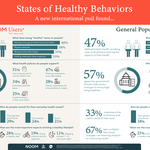Findings show that health has taken on a new meaning for people across the globe — bringing new priorities and challenges with it
NEW YORK–(BUSINESS WIRE)–Noom, a leading digital health platform focused on behavior change, today released its second-annual ‘States of Healthy Behaviors’ report, the result of an eight-nation consumer survey focused on how people are approaching their health goals, and the barriers they experience along the way.


The findings reveal not only a continuation of people prioritizing their health since the Covid-19 pandemic, but also a new direction for this focus: More and more, people are thinking about their health holistically. When asked to define what it means to be “healthy,” the top answers were being physically fit (31%), exercising regularly (31%), being emotionally happy (30%), and getting adequate sleep on a regular basis (30%).
“It is encouraging to see people across the globe thinking about health in multifaceted, holistic ways, and embracing the mind-body connection,” said Saeju Jeong, co-founder and CEO of Noom. “This realistic approach signals that our society is shifting toward more sustainable health practices, a philosophy that we have believed in since our beginning at Noom. We hope to see more digital health organizations promote holistic solutions as it’s clear our industry has a continued opportunity to lead dialogues about what health looks like and how to maintain it for the long-term.”
In tandem with this general population survey, Noom asked active U.S. users about their opinions regarding health and found that people actively engaging with the digital health platform had a better understanding of how to tend to their holistic health, with 68% of respondents defining the concept as taking care of all physical and mental aspects of their health — only 47% of the general population shared this understanding. Moreover, 40% of Noom users defined being healthy as “having more good habits than bad habits,” whereas the general population was more focused on being physically fit. The data also showed that Noom users are more than twice as likely to understand the caloric density and nutritional value of their food than non-Noom users.
“At Noom, we believe that achieving optimal ‘health’ requires tending to four key pillars: nutrition, fitness, sleep, and stress management, which is why we promote a full mind-body approach within our curriculum,” said Noom’s Chief of Psychology, Andreas Michaelides, Ph.D. “To know that our Noomers are internalizing this way of thinking affirms that we are implementing the right tactics to achieve our mission of helping people everywhere live healthier lives.”
Despite these positive shifts, there remain considerable barriers in the global quest for improved health. A majority of respondents (average 57% globally) report wanting government support in caring for their health — respondents believed that government interventions like improving access to mental health care (34%), making medications more affordable (24%), and banning artificial preservatives (21%) would all positively impact their health and well-being.
Highlights From Noom’s 2023 ‘States of Healthy Behaviors’ Report
The second-annual survey takes a look at how eight nations perceive health.
- The survey polled 8,000 people spanning five continents: Australia, Brazil, Germany, New Zealand, South Korea, Spain, the United Kingdom, and the United States.
Of the nations surveyed, Spain is the “healthiest” with 91% of respondents reporting that they currently feel healthy.
- 33% of respondents from Germany, on the other hand, report feeling “unhealthy.”
The pandemic spurred people everywhere into action when it comes to taking care of themselves.
- 53% claimed they prioritized their health more.
Taking a look at the U.S. specifically, people are thinking about their health holistically.
- Their top health priorities are getting more sleep (61%) and managing stress (62%) beating out exercising and eating healthy.
- 34% of respondents prioritize their mental wellness more often than my physical wellness.
But, they are also faced with some familiar challenges:
- 33% believe lack of motivation is a barrier to health.
- 30% don’t have accountability when it comes to living a healthier lifestyle.
- One quarter of respondents consider themselves less productive since the start of the pandemic.
Even so, building healthy habits is top of mind, especially as we move away from the Covid-19 pandemic.
- In an attempt to be healthier, half of people have implemented between three to five new habits as part of their daily routine
- 50% of people have started to take their overall health more seriously since Covid-19.
And many are optimistic about their health as they look to the future.
- 40% of people think their generation is more healthy than their parents’ generation.
- 67% of Americans believe they can lose weight by implementing small changes.
They also know what they need to maintain their health.
- Half of people say support from a mental health professional and friends/family helps them stick with building good habits.
For more findings from the 2023 ‘States of Healthy Behaviors’ report, visit www.noom.com/report2023.
About Noom
Noom is a psychology-based digital health platform powered by data, technology, and human coaches that helps millions of people meet their personal health and wellness goals from weight management to diabetes prevention to stress reduction. The company has been awarded multiple grants from the National Institutes of Health and was the first mobile application to be recognized by the Centers for Disease Control and Prevention as a certified diabetes prevention program. Headquartered in New York City, Noom has been named one of Inc.’s Best Places to Work, Quartz’s Best Workplaces for Remote Workers, and Fortune’s Best Workplaces in Technology. For more information visit www.noom.com.
Contacts
Noom Communications
comms@noom.com




